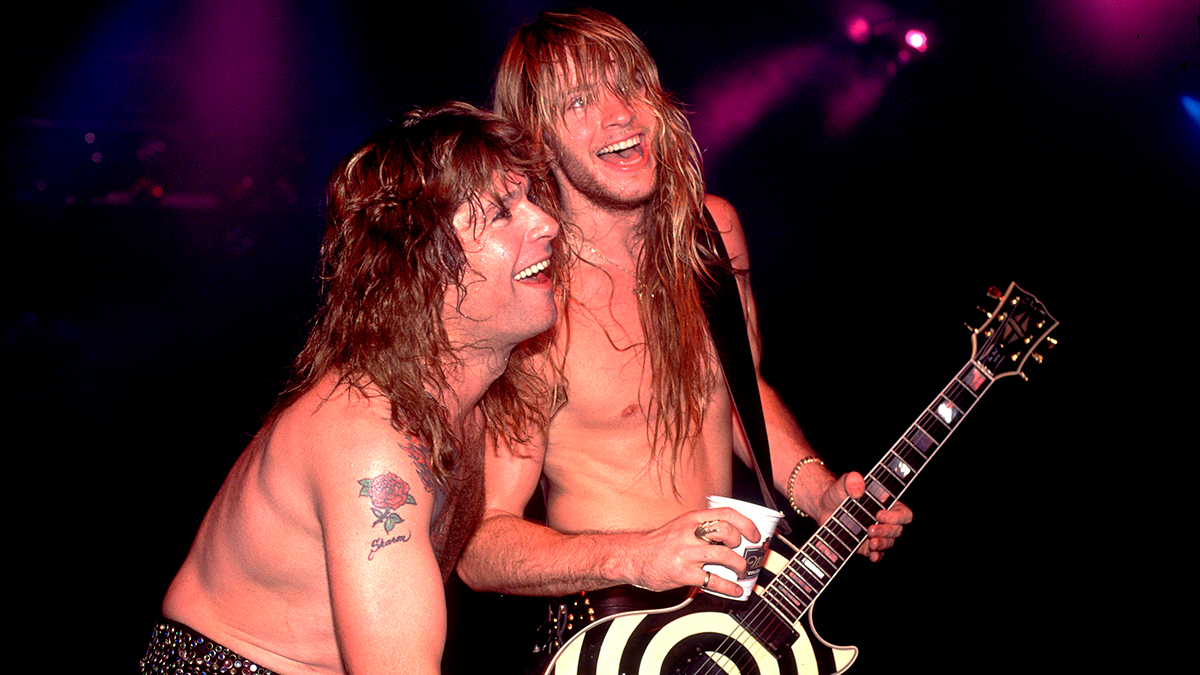We went guitar shopping with Slash – here's what happened
That time Slash and GW spent an afternoon browsing – and buying! – at Norman’s Rare Guitars in Tarzana, California
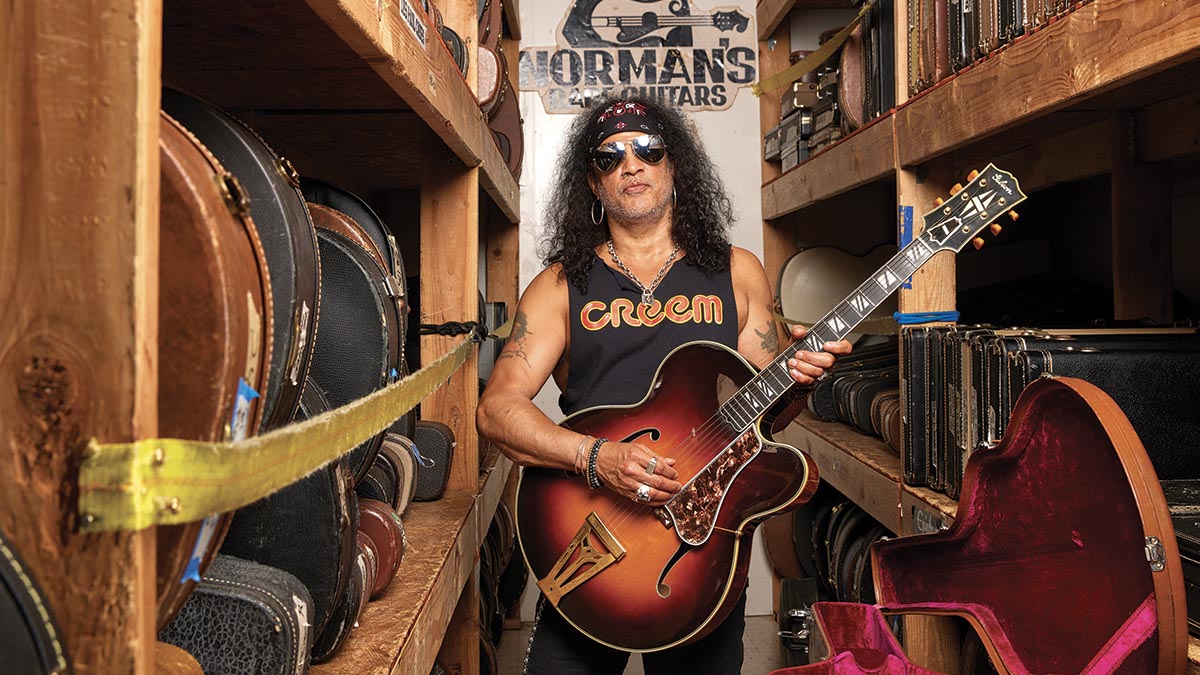
Walking into Norman’s Rare Guitars on a sunny afternoon, Slash is a man on a mission. Specifically, that mission is to find a ’59 Gibson Les Paul. And not just any ’59 Gibson Les Paul. He’s on the hunt for a Tobacco Burst – a rare and coveted finish on what is already a rare and coveted guitar model. “There’s only two that I know of,” Slash says.
One of the two, he used to own – it’s the famous model he uses to rip the solo outside a church in Guns N’ Roses’ November Rain video. “But it was Joe [Perry]’s and I gave it back to him,” he says.
Slash still has three 1959 examples in his possession – “One’s basically a Lemon Burst, and the other two are faded Cherry Sunbursts,” he says. But he calls the Tobacco Burst his favorite finish. “So I figured I should put the word out there. Because it’s not going to just come walking up to my door.”
Which is why Slash has come walking through Norman’s door. Because if anybody in L.A. can find a rare guitar, it’s Norman Harris, who has been dealing vintage instruments for more than 50 years, and whose Tarzana, California, shop is a go-to destination for artists, collectors and everyday guitar fans alike.
Harris, who greets Slash on this day, doesn’t have a Tobacco Burst ’59 on hand (“That’s a tall order,” he acknowledges), but he assures Slash he’ll put some feelers out. In the meantime, he has plenty of other vintage beauties for us to look at.
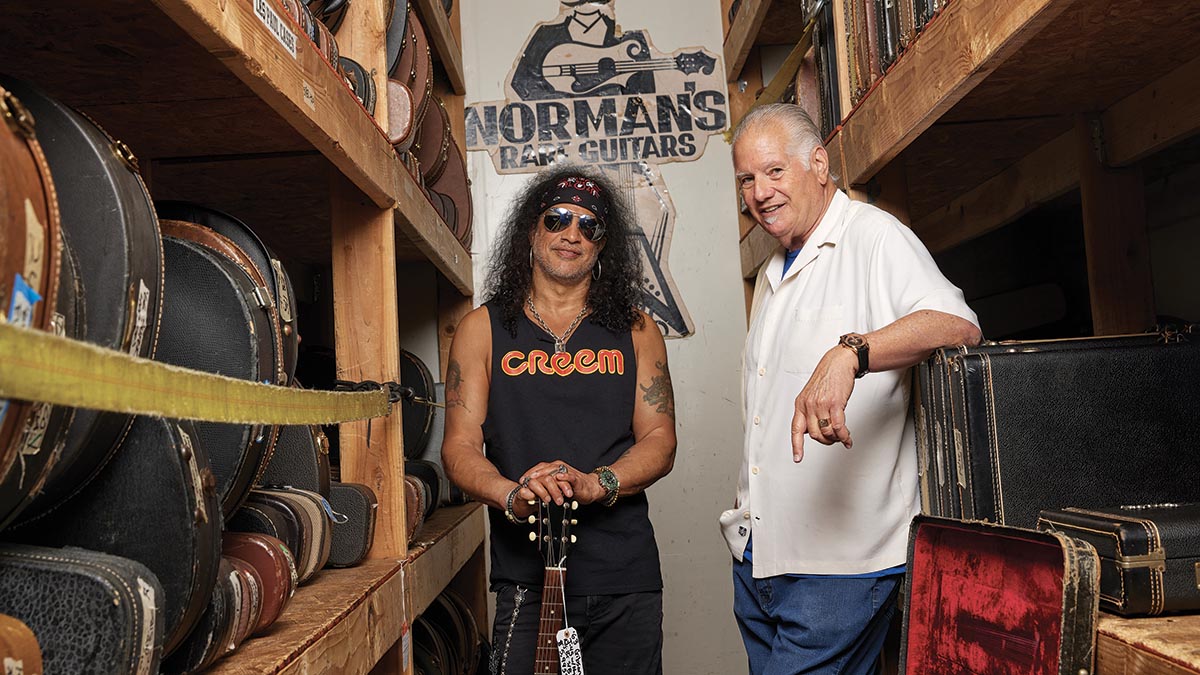
As for Slash, he admits he’s a guitarist who doesn’t really frequent guitar stores.
“They’re overwhelming,” he says. “It’s like going to a restaurant where the menu’s 30 pages long.” That said, he’s been friendly with Harris for decades, and when he wants to shop, Norman’s is his spot. “I’ve known Norman for a long time, and he’s got one of the most comprehensive guitar stores around,” Slash says, then laughs. “I live in the vicinity, and when I moved here I thought, fuck, this is dangerous…”
All the latest guitar news, interviews, lessons, reviews, deals and more, direct to your inbox!
And with that, we have a look around.
I’ve known Norman for a long time, and he’s got one of the most comprehensive guitar stores around. live in the vicinity, and when I moved here I thought, fuck, this is dangerous…
As Slash walks alongside the rows of premium new and vintage models, Harris points him toward a few choice items, including a rare Stromberg with a $40,000 price tag and a 1930s Larson Brothers Mauer, “one of the fanciest acoustics you’ll see,” Harris says. He also highlights a prototype of Epiphone’s Joe Bonamassa 1958 “Amos” Korina Flying-V, which leads Slash to reminisce about the first Epiphone he ever owned, which he says was also his first “good” acoustic.
“It was a 1930s Epiphone dreadnought,” he tells us. “When I was 15 I would do some babysitting, and at this one house they had it hanging on the wall next to a mandolin. I said to the parents, ‘Can I play it when the kid’s asleep?’ I was still playing it when they came home, and they actually ended up giving it to me. And I still have it – the fucking tailpiece is coming out of the body, but it’s hanging on.”
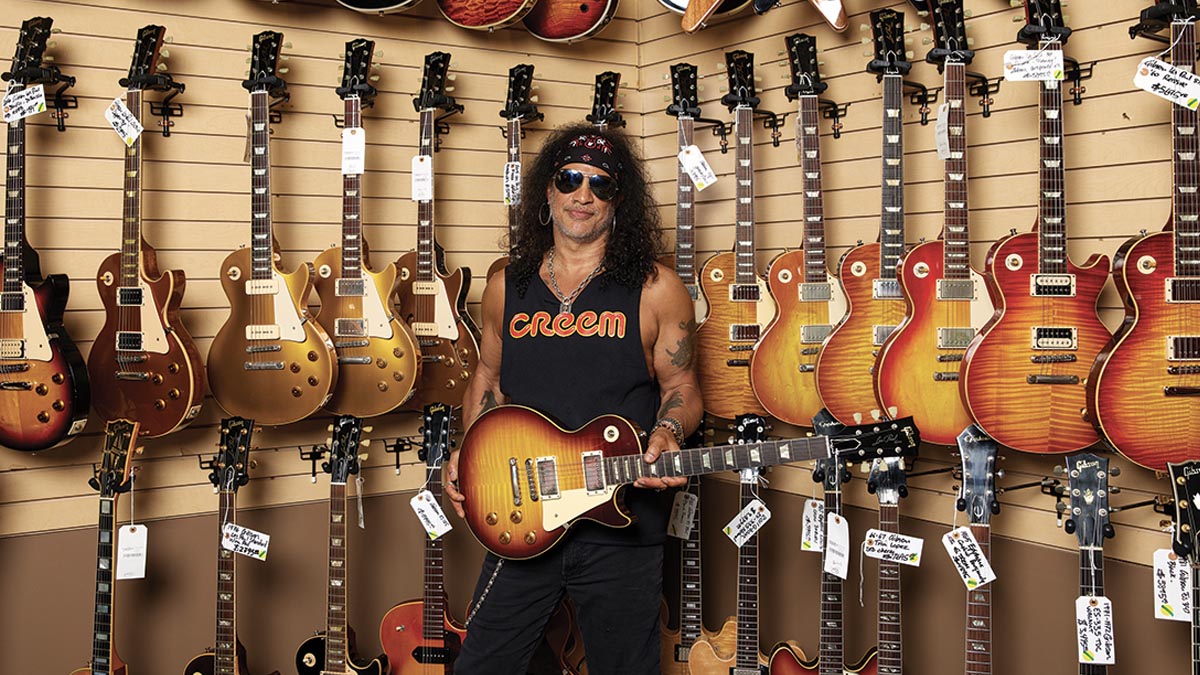
Despite Slash’s previous assertion that he’s not much of a guitar-store fan, he has a rich history with them. “When I was 17 or 18 I used to work in one – Hollywood Music Store, on Fairfax and Melrose,” he tells Guitar World as we walk the perimeter of Norman’s.
“It was owned by Hiro [Misawa], a Japanese businessman who I think had a music store in Tokyo and then came over to the States. If I remember correctly, it was the only authorized B.C. Rich dealer in town. And that was my first good electric guitar, a B.C. Rich Mockingbird that I got there. Before that, I think I bought an Explorer for a hundred bucks and I took it back and traded it for a Les Paul. But those were just copies.”
There’s one other piece of Slash history attached to the Hollywood Music Store – it’s where he first met Izzy Stradlin.
“Izzy came in one day because he had seen a drawing I had done of Aerosmith, and he was looking for the guy who made it,” Slash recalls. “That was the first time we ever met. And then later on we hooked up and he played me his demo [of pre-Guns N’ Roses band Hollywood Rose]. That was the first time I heard Axl.”
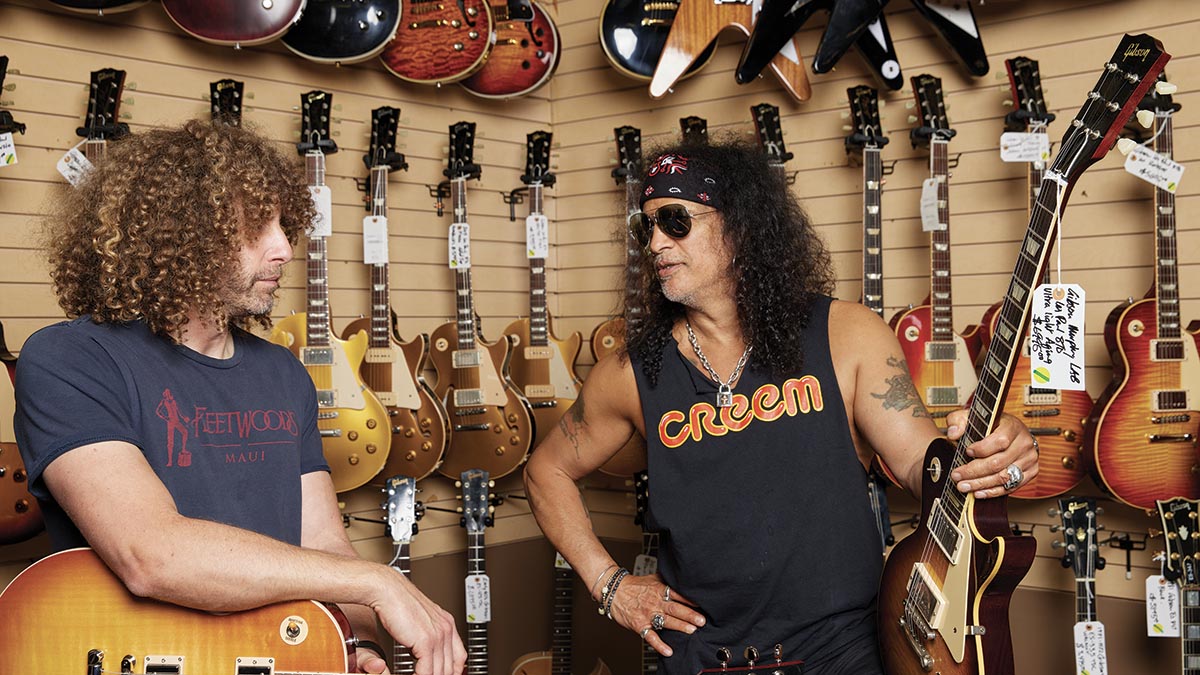
As for whether he was a good employee?
“All things considered, yeah, I was,” Slash says. “Although there’s a ‘commission salesman’ mentality that was hard for me to wrap my head around. Like, ‘If you sell this, you’re going to get paid this percentage on it.’
“I remember one of the guys I used to work with, his name was Phil, he was an older guy and he had been a Guitar Center commissioned salesman. He came down to Hollywood Music Store and started working there, and he was great at it. He was from Texas, and he had this real cool kind of demeanor – cowboy boots, plaid shirts, mustache…” Slash laughs. “He tried to show me the ropes. And I tried my damnedest to do a good job.”
During his days at the store, Slash recalls, “all these guys used to come in while I’d be working, pick up guitars and play their latest Randy Rhoads stuff for two hours, just sitting on an amp. It was crazy. I was never that guy.”
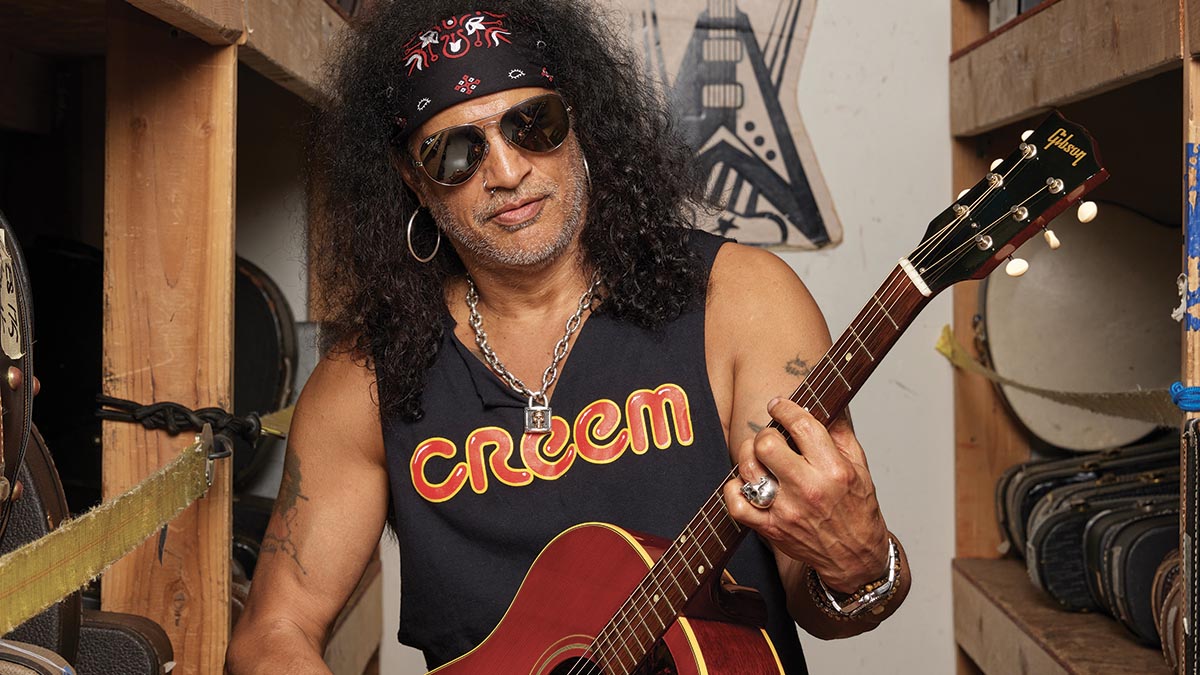
Despite the fact that he regularly plays on some of the biggest stages in the world, and to tens of thousands of fans at a clip, he maintains that he’s “never liked playing in front of people in a store. So when I did go to a store, I was always looking for something specific. Then I’d tinker with it for a second and put it down, because I felt very self-conscious if anybody else was there. I’m still like that.”
And anyway, Slash continues, “I don’t buy guitars just to have guitars. It has to be something I’ll actually use. I do have a couple guitars that are outside of my normal thing that you’re used to seeing me with, but I find that they only interest me for a second, because they sound like ‘that.’ Whatever it is they are, that’s what they sound like. Which is not really what I’m going for. I’m trying to sound like me. So I end up not buying anything too crazy.”
Of course, Slash is still, like all of us, a guitar lover. And that means that even if he tends to be specific about what it is he’s looking for, he’s also susceptible to making spur-of-the-moment purchases. “And that’s why guitar stores can be dangerous,” he says. “You go in looking for one thing, and then you see something else that you don’t necessarily need, but you feel you have to have it… and you end up buying it.”
Over the course of the pandemic, Slash popped into Norman’s to purchase a few very particular items, including a ’56 Les Paul Goldtop, some Fender Deluxe amps and a mid-’60s six-string bass, “which is killer, and which I actually needed,” he says.
For his visit today, Harris has pulled aside some choice instruments, and so we make our way beyond the store’s showroom floor to a narrow, tightly packed corridor in the back to check them out. “We call this room our ‘secret stash,’ Norman says. “It’s for good friends of the store and people who know what this stuff is.”
First up? A 1963 Gibson J-45 that Norman calls “pretty stunning.” The acoustic, he says, “has been sitting in my warehouse, where I have maybe a few hundred guitars, for probably 25 years. It’s hardly played, and it’s about as good an example as you’ll ever see.” Slash picks up the instrument, rests it on his knee and spools out some chords and bluesy single-note lines before playing a series of arpeggios up the neck. A smile creeps across his face. “See?,” he says. “Dangerous.”
From there, Harris pulls out a pristine 1923 Gibson F-5 Lloyd Loar, which he calls the “sunburst Les Paul of mandolins.”
“Some of these had a Virzi Tone Producer, which a lot of people don’t like,” Harris says. “This one is what they call a ‘pre-Virzi.’ So it’s like the very top of the line when it comes to mandolins.”
Finally, Harris eyes a row of black hard cases crammed on a high shelf and reaches up to pull out one case in particular. “Since we’re talking Gibson, this is an L-4C from the Fifties,” he says, opening the case to reveal a stunning blonde archtop. “It’s got flatwounds on it and it’s in almost-new condition. It’s one of those guitars that’s almost like a time machine.”
The blonde finish, Harris continues, is especially choice. “The thing about blonde guitars is that they had to use the best wood for them, because if there were any imperfections in the wood, it would show. Whereas if it was, say, a sunburst finish, they could just fade around it. And that’s why when guitars were priced, the blondes were always more. Because they couldn’t use imperfect wood.”
Harris returns the L-4C to its case and we head back out to the main showroom. But not before Slash comments, rather, um, dangerously, “I may want to check out that J-45 one more time…”
Given that we’ve already killed the better part of an afternoon at Norman’s, it’s about time to head out. But not before we make one more stop – the wall of Les Pauls, of course. We each grab a Standard – Slash a rich Cherry Sunburst, ours more a lemony hue – and spend a few minutes playing. Rest assured, no Randy Rhoads licks were attempted.
Afterwards, guitars are returned to the wall and Slash packs up to leave. At the front desk, however, there’s something waiting for him – that 1963 Gibson J-45 from the “secret stash” room. Slash signs the invoice, puts the acoustic in its case and heads for the door. He turns around to give one final wave to Harris, and then makes his way into the L.A. afternoon sun, his newest Gibson companion by his side.
- 4 is out now via Gibson Records.
Rich is the co-author of the best-selling Nöthin' But a Good Time: The Uncensored History of the '80s Hard Rock Explosion. He is also a recording and performing musician, and a former editor of Guitar World magazine and executive editor of Guitar Aficionado magazine. He has authored several additional books, among them Kurt Cobain: Montage of Heck, the companion to the documentary of the same name.

